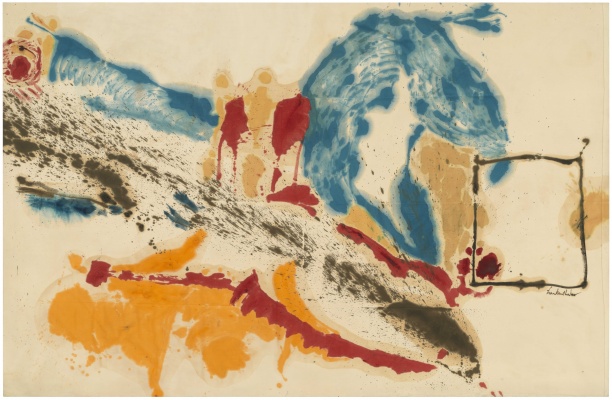Descripción de la Exposición
Henrique Faria Fine Art is pleased to present Analogues and Opposites, an exhibition that brings together a selection of
works on paper and paintings on canvas and wood from points that span Gerd Leufert’s multifaceted career. Leufert worked
in many mediums throughout his life, including engraving, printmaking, sculpture, photography, painting and drawing, and to
these materials he applied his interest in modern design, typography and color, thereby creating a diverse and dynamic
body of work. Curator Tahía Rivero has organized the works in the exhibition according to Leufert’s use of color and
technique as a way to show not only the overarching similitudes found in his work, but also the ways in which, despite the
resemblances, each work appears as unique.
The pieces hung in the back room demonstrate Leufert’s early fascination with the monochrome and its later transformation
into striking ink on paper works. In AM (1956), Leufert achieves texture and depth through the perpendicular brushstrokes
and coarse scratches that mark the surface of a seamless blending of dark brown into black oil paint. By mixing casein in
with the oil, Leufert gave the paint a glossy sheen that makes the already dark colors even richer and more opaque, and
imbues the work with a sense of mystery. An untitled work on paper from c. the 1980s employs the same color scheme as
AM but uses gestural brushstrokes of milky dark ink to create the composition. As Rivero alludes in her text, these
atmospheric works can both be interpreted as Northern European landscapes but through the artist’s focus on media and
method, they demonstrate his ability to create multiple spaces on a single plane and his prowess for creating “freestyle
graphic design and abstract drawings.”
The works in the series Nenias, with a stark gestalt of black forms on white backgrounds, take the form of ideograms or
graphisms–another example of Leufert’s affinity for graphic design and typography. As Rivero explains, the Nenias conjure
a visual tension in the viewer as the forms created both elude and suggest semantic content, while their contemporary
method of production–silkscreen, lithography and digital projection–contrasts with the figures’ enigmatic aura.
The series of Listonados and the selection of acrylic paintings, which are on view in the front gallery, also evoke a tension in
the viewer, but in this case through Leufert’s playful use of positive and negative space and the optical effects generated
from his use of color. Executed in the late 60s through the early 70s, the Listonados brought painting off of the canvas onto
the frame itself and transformed the frame into a sculptural support. The Listonados are hung from the ceiling, rather than
being hung on a wall or placed on a pedestal, so as to draw specific delineations in space and create vistas that connect
one side of the gallery space to the other. The painting Coro (1966) creates a sense of depth and dynamism through the
interplay of its saturated fields of color: neon green, bright vermillion and pale purple. Made in between two periods of highly
gestural work, Coro demonstrates not only the fluidity in Leufert’s stylistic shifts but also the confidence in his ability to
reinvent and reinvigorate his practice.
As Rivero concludes her text with a quote from the Venezuelan art critic Juan Calzadilla, “Leufert has demonstrated that he
is an experimental artist. His work signifies in each period a point of evolution always conditioned by the possibilities the
materials offer him and by the need to be contemporary.”
Gerd Leufert (Memel, 1914 – Caracas, 1998) attended the Akademie der Bildenden Künste (Academy of Fine Arts) in Munich in 1939 where he studied graphic design, and became a member of the Werkbund, an interdisciplinary association founded on the social importance of design and craftsmanship. He worked for several German publishing houses, and upon migrating to Caracas, Venezuela, in 1951, continued to work as a designer. Leufert’s contribution to visual culture, graphic design, and museology is paramount in Venezuela. He was credited with bringing the rigor of German design principles to the country, and was well regarded for his work as an art and graphic design teacher in various Caracas educational institutions. Over the next four decades Leufert participated in solo and group exhibitions in Germany, France, Holland, Colombia, the United States and Mexico.
From 1961 to 1973, Leufert worked at the Museo de Bellas Artes (Museum of Fine Arts), Caracas, first as a designer, rebranding the museum’s visual identity, and later as the curator of drawings and graphic design. In 1990 he was awarded Venezuela’s Premio Nacional de Artes Plásticas (National Fine Arts Prize), followed by an exhibition of his photographs at Sala RG, Caracas. In the last years of his life, Leufert continued to exhibit his drawings and photographs at Centro Cultural Consolidado, Caracas (1992), Museo de Arte Contemporáneo de Maracay Mario Abreu (1992), and Museo de Bellas Artes (1994–95).

Exposición. 11 abr de 2025 - 28 sep de 2025 / Museo Guggenheim Bilbao / Bilbao, Vizcaya, España

Formación. 08 may de 2025 - 17 may de 2025 / Museo Nacional Centro de Arte Reina Sofía (MNCARS) / Madrid, España